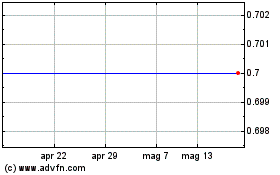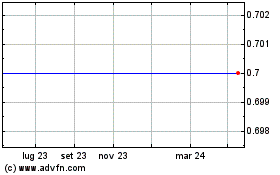AB Linas Agro Group results for the 12 months of 2022/2023
financial year: challenges for agribusiness and recovery for food
businesses
Consolidated revenue of AB Linas Agro Group and
its controlled companies (the Group) for the twelve months of the
2022/2023 financial year exceeded EUR 1,999 million and were 5%
higher compared to the previous year (EUR 1,896 million).
The Group sold almost 3.7 million tons of
various products, nearly the same as in the same period last
year.
Consolidated earnings before interest, taxes,
depreciation, and amortization (EBITDA) for the twelve months
amounted to almost EUR 67 million, 49% lower than the previous
year. Net profit fell by 74% to EUR 20 million.
|
EUR thousand |
2021/202212 months |
2022/202312 months |
2022/2023compared with2021/2022, % |
|
Gross profit |
188,859 |
136,758 |
-28% |
|
EBITDA |
132,173 |
66,950 |
-49% |
|
Operating profit |
103,619 |
41,124 |
-60% |
|
Net profit |
77,257 |
20,462 |
-74% |
Fourth quarter consolidated revenue amounted to
EUR 499 million, down 9% year-on-year. The fourth quarter gross
profit fell by 72% to EUR 24 million; last year's operating profit
of EUR 63 million turned into a loss of EUR 0.6 million. The net
loss for the Q4 amounted to almost EUR 4 million, compared to a net
profit of EUR 51 million in the corresponding period last year.
"Challenges for agriculture and related
businesses, recovery for food businesses" is how Mažvydas Šileika,
the Chief Financial Officer of AB Linas Agro Group, described the
year that ended.
The Group sold 2.1 million tons of grains and
oilseeds during the 12 months, the same as last year. Sales of
compound feed, premixes, and raw materials for feed were 841
thousand tons, 2% less than the previous year. The total revenue of
the Grain, Oilseeds, and Feed Segment grew by 3% to EUR 745 million
in the period under review, while the operating profit decreased by
67% to EUR 16.8 million.
"It was difficult to sell a poor-quality product
in a falling market. Grain traders were operating in a bear market
- for instance, the price of wheat, which accounts for 80% of sales
in this segment, was 30% lower at the end of the period than at the
beginning. Russia, which sells wheat at a lower price, was a major
player in depressing the overall profitability of the business,
pushing down cereal prices and premiums on the market. Grain grown
in the Baltic countries in 2022 was of poor quality and not
attractive to buyers, and had to be sold at a price discount, which
resulted in a 19% lower gross profit on grain and oilseeds trading
compared to the previous year," said M. Šileika.
According to M. Šileika, although the demand for
compound feed remained high during the period under review, there
was a global downward trend in the consumption of feed materials,
which led to an increase in their supply during the year, as well
as to increased competition from Polish producers and pressure on
prices. As the Group had previously purchased a significant
quantity of raw materials for feed production at higher prices, the
decrease in the selling price of feed impacted the overall
profitability of the segment, as the gross profit of the feed
business contracted by 50%. During the reporting period, sales of
soybean meal and other raw materials remained stable or even
increased, but sales and gross margins of feed-grade vegetable oil
contracted by 60% and 63%, respectively.
"Vegetable oil trading, normally a profitable
business, has contracted due to the volatility and uncertainty of
supplies from Ukraine, especially as the market price of vegetable
oil was at a three-year low due to the fall in oil prices and
reduced demand from major importing countries. However, we expect
vegetable oils to remain a sought-after commodity," said M.
Šileika.
The Group's Products and Services to Farmers
business grew 8% to EUR 416 million while operating profit fell by
79% to EUR 35 million. Sales of seeds, plant care products, and
fertilizers grew by 6% to almost EUR 308 million. Revenues from the
sale and rental of agricultural machinery, supply of spare parts,
and servicing increased by 20% to EUR 98 million. Income from grain
storage and livestock farm installation projects contracted by 15%
to EUR 10 million.
"The Products and Services to Farmers business
has experienced several challenges, which I would describe as
"negative expectations and constraints". In the fall, fertilizer
prices shot up in the face of higher energy prices and uncertainty
about the possible shutdown of fertilizer plants. At the time of
fertilizer purchase, it looked as if they would continue to rise.
Those expensive fertilizers had to be sold at fallen prices in the
spring. They were sold at 10% less and at a very low profit, when
typically, fertilizers generate a large part of the Segment's
profit. Competition was also fierce in the spring in the other
groups of products for crop production: only seed sales were better
than last year, while gross profits in the plant care products and
micronutrients trade shrank by 11% and 16%, respectively, despite a
slight increase in revenues. Low cereal prices in spring meant
farmers bought fewer inputs than needed for a good harvest.
In the second half of the financial year, EU
funding for tractors, harvesters, and plows was banned in the
Baltic countries, severely affecting trade in these machines.
However, sales in the first half of the financial year were so good
that the annual figures for this activity are better than last
year, with gross profit from the sale, rental, servicing of new and
used agricultural machinery, and spare parts trade rising by 51% to
EUR 14.6 million.
Fearing a cold spring, dry weather, rising
costs, more expensive financing, and falling grain and raw milk
prices, a number of farms have slowed or abandoned investment in
grain preparation equipment, which has seen sales shrink by 28% and
gross profit fall by 9%," said M. Šileika.
The Group's agricultural companies' revenues
grew by 28% during the period under review and exceeded EUR 50
million. Operating profit decreased by 17% to EUR 12.5 million.
"We sold 104 thousand tons of crop production,
14% more than last year. Crop production revenue grew by 45%, but
due to an increase of almost 20% in the cost of production and a
drop in grain procurement prices throughout the year, crop
production profitability was lower than in the previous financial
year, with gross profit falling by 10% to EUR 8.9 million. The
general trend in market prices was unfavorable for all farmers
throughout the period under review, except at the beginning of the
financial year. We usually spread our risk and sell our production
throughout the year so that some sales were at higher prices and
others at lower prices. The market is rarely predictable, and in
times of war, not at all predictable.Milk procurement prices were
also favorable only in the first quarter of the financial year and
then declined throughout the period. We sold 6.5% more milk and
received 9% more income from milk because the quality of our milk
is excellent, resulting in a price premium. However, the high feed
price during the period under review increased the cost of milk
production, and the 8% fall in farm gate prices reduced the gross
profit of this business. Sales of live-weight beef were
loss-making. However, the livestock business generated a gross
profit of EUR 3 million because we have very efficient dairy
farms," said M. Šileika.
The Food Segment, which includes the poultry and
flour-related businesses, grew by 20% to EUR 416 million in the
period under review. Operating profit was EUR 7.9 million, compared
to a loss of EUR 1.8 million in the same period last year.
"The production of poultry meat and poultry meat
products has decreased by 10% compared to last year, as we closed
the poultry slaughterhouse in Kaišiadorys last spring. The poultry
business' revenues increased by more than 13% to EUR 296 million.
Still production costs were also high due to the advance purchase
of raw materials for feed and high energy costs in the cold season,
so the gross profit of poultry farming shrank by 10% to EUR 15
million," notes M. Šileika.Cereal processing is showing strong
growth, with sales of flour and flour mixes, instant products, and
breadcrumbs mixes up 40% to EUR 119 million and gross profit up 75%
to EUR 16 million. We plan to increase the production of both
breadcrumbs and instant products, which is where most of the growth
will be. If we produced more than 265 million units of instant
products this year, by 2025 we will have almost doubled that number
with the new noodles factory in Alytus. The expansion of breadcrumb
production is also starting to materialize - we have already
earmarked a site in Kėdainiai for a new plant, which we expect to
start up in the second half of 2024. With the new plant, annual
production of breadcrumbs will increase from 9.6 to 21.6 thousand
tons. We also have expansion plans for the ready-to-eat food
factory in Širvintos, which we acquired in July - in 5-6 years, its
production should increase 3.7 times to 33 million packets", - said
M. Šileika about Group’s desire to expand his activities in the
Food Segment. The Group's other activities include providing pest
control and hygiene products and services, manufacturing and
selling pet food, wholesale and retailing veterinary goods, and
other activities not included in the other Segments. The segment's
total revenue contracted by 40% to EUR 22 million, with an
operating profit of EUR 0.8 million, compared to a loss of EUR 2
million the previous year.
"It would be difficult to compare annual figures
with last year's at the moment. In 2021, with Kauno Grūdai, many
new activities were added to the Group, organizational
transformations took place, and therefore, we reviewed and adjusted
the allocation of activities to this segment. From the beginning of
the next financial year, the allocation of activities between
segments should be completed, and no further changes will be made.
However, it should be noted that all the activities that will
remain in this segment in the future have shown profitability
growth, and, for example, the unprofitable veterinary supplies
business has become profitable. Also, the profits of pet food and
pest control services have shown growth," said M. Šileika.
AB Linas Agro Group owns the largest group of
agricultural and food production companies in the Baltic States,
employing almost 5 thousand people. The Group operates along the
entire food production chain from field to fork, producing,
processing, and marketing agricultural and food products and
providing goods and services to farmers. In July, the Group
acquired a modern robotic plant in Širvintos (Lithuania) from AUGA
group, AB, which is active in the production and sale of
ready-to-eat food products; its main products are organic soups,
curries, cereal dishes, and organic canned vegetables in packages-
about 70 product names.
Attached:Consolidated Unaudited Financial
Statements and Consolidated Interim Report of AB Linas Agro Group
for the twelve-month period ended 30 June 2023
AB Linas Agro Group Chief Financial Officer
Mažvydas ŠileikaMob. +370 619 19 403E-mail
m.sileika@linasagro.lt
- LNA_2022-2023_reports_12_months
Grafico Azioni Akola Group Ab (LSE:0NSG)
Storico
Da Mar 2024 a Apr 2024

Grafico Azioni Akola Group Ab (LSE:0NSG)
Storico
Da Apr 2023 a Apr 2024
